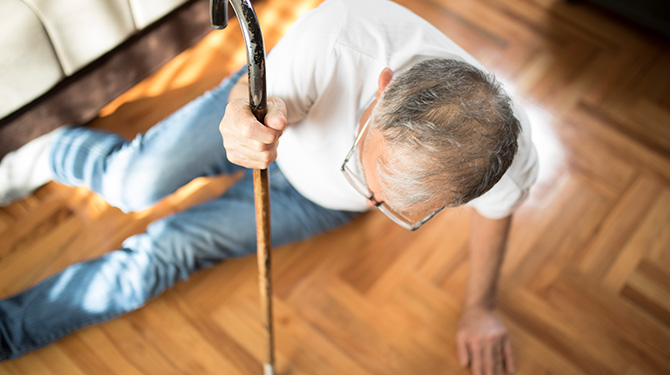Fall Assessments
You may need a fall assessment if one of the following is true:
- You have slipped or fallen in the past year.
- You lose your balance or feel unsteady or dizzy while walking.
- You need assistance to stand up.
- You experience dizziness when standing up, moving your head quickly or rolling over in bed.
Your physician may refer you for an assessment, or depending on your insurance, you may make an appointment directly, without a referral.
What Happens During a Fall Assessment?
Your fall assessment will last from 45 minutes to an hour. Wear comfortable clothes and a pair of sneakers or walking shoes.
During your assessment, a physical therapist will take a detailed medical history. You will also be asked to perform exercises to assess your balance and vestibular or neurological function.
Each assessment is different and is based on your needs. You may be asked to do the following:
- T.UG. Test (Timed Up & Go) – During a TUG test, you will be asked to stand up from a seated position, walk ten feet, turn around and sit back in the chair.
- Gait Speed Test – A gait speed test evaluates how quickly you can walk certain distances.
- Functional Reach Test – A functional reach test measures your reach; you will stand near a wall and reach forward.
- Four Square Step Test – In this test, there is an X on the floor with four boxes labeled 1 through 4. You will step into each box in order, moving clockwise, and then move counterclockwise back to 1.
- Sit to Stand Test – Your physical therapist will count how many times you can go from a seated position to standing. These movements will be timed.
- Berg Balance Test – To evaluate your balance, your physical therapist will ask you to walk and turn your head.
- Vestibular Screening – If you’re dizzy or have vertigo, your therapist will likely focus on your vestibular (inner ear) system. He or she will look at your eye and head movements to determine what is causing your dizziness.
- Neurological Screening – This screening evaluates your reflexes and your ability to complete everyday activities, such as getting in and out of chairs or moving to a sitting position from bed. Patients who had have strokes or any condition relating to the central nervous system may require a neurological screening.
Fall Prevention
For people who are at risk for falling, physical therapy will help to strengthen the lower body and improve balance.
If you are able to exercise safely at home, you will be asked to continue your exercises in between appointments. You will receive a printed exercise program that you can take home with you.
Your physical therapist will also inform your family of your treatment plan – which exercises you should be practicing at home and for how often.
After your balance has improved, you will be discharged from physical therapy and continue your home program. Because exercise is crucial in maintaining your balance, your physical therapist will recommend ways to stay active and tell you about programs in the community.
Some patients make a yearly appointment for physical therapy to receive additional guidance and reassess their balance.
Your physical therapist will also suggest changes to your home that can reduce the risk of falling, such as removing throw rugs. If you need a more detailed assessment, our home care staff can come to your home and suggest changes to improve your safety.
Making an Appointment
If you would like a fall assessment, please call one of the offices to make an appointment – a referral from your doctor is not needed for most insurances.
If you have Medicare, Medicaid, No Fault, or Workers Compensation, please ask your doctor for a referral before making your appointment.

 Although we often think of falls in the winter, when slippery conditions can cause us to slip, falls occur any time of year, inside and outside.
Although we often think of falls in the winter, when slippery conditions can cause us to slip, falls occur any time of year, inside and outside.